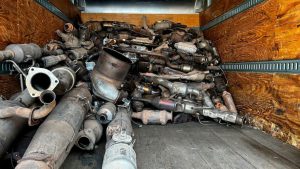
Phoenix cops find 1,200 catalytic converters as thefts soar
By Bob Christie | AP
May 27, 2022 at 7:54 p.m. EDT | Originally published on The Washington Post —

This photo provided by the Phoenix Police Department shows stolen catalytic converters that were recoverd after detectives served a search warrant at a storage unit Phoenix on Thursday, May 27, 2022. The bust came amid a national surge in thefts of the pricy auto parts that play a critical in reducing vehicle emissions and has led lawmakers in 36 states and in Washington D.C. to consider new laws to address the problem. (Phoenix Police Department via AP) (Uncredited/Phoenix Police Department)
PHOENIX — An Arizona man was facing multiple theft charges Friday after detectives found more than 1,200 catalytic converters packed into a storage unit, a case that highlights a national surge in thefts of the pricy auto parts that play a critical role in reducing vehicle emissions.
The discovery followed a months-long investigation that began with a January tip that someone was storing stolen catalytic converters in an industrial area near Phoenix Sky Harbor International Airport.
“We were very surprised at the amount in there,” Phoenix police Det. Adam Popelier said in a police video taken Thursday as officers were pulling converters from the jam-packed storage locker.
The 48-year-old man who police say was buying and selling the convertors was charged with 40 counts of theft and may face additional charges.
The huge rise in catalytic converters thefts across the nation has hit tens of thousands of car and truck owners in the pocketbook and frustrated police, who are faced with a crime that takes just minutes to commit and is difficult to solve even if they find the stolen parts.
Catalytic converters are not imprinted at the factory with serial numbers and stolen converters end up on a black market where they are chopped open for the valuable metals they contain.
Replacing one can cost a motorist from $1,000 to $3,000, according to the National Insurance Crime Bureau, an insurance industry group that works to combat insurance fraud and crime. Police say thieves can get from $100 to $150 for each converter.
The insurance group counted just 3,969 reports of stolen catalytic converters in 2019, more than 17,000 in 2020 and more than 52,000 last year.
Lawmakers across the nation have taken notice, introducing legislation designed to make it harder for criminals to unload their loot. According to the National Insurance Crime Bureau, 150 bills have been introduced this year in 36 states and enacted in 16 states.
That includes Arizona, where Republican Gov. Doug Ducey signed a bill this month that makes possession of a catalytic converter in many instances a crime and adds detailed reporting requirements for scrap dealers that buy legitimate used devices. They must mark the item with the donor vehicle’s serial number and retain it for at least a week in original condition.
Scrap dealers caught with unregistered or stolen converters face a $500 fine for the first offense, a $2,000 fine for a second and at least double that for each additional time they are caught. Those possessing or trying to sell a used catalytic converter that don’t meet new requirements could face a six-month jail sentence.
Federal legislation is also in the works. Indiana Rep. Jim Baird is sponsoring a bill backed by the National Insurance Crime Bureau that would require serial numbers on new devices, offer grants for programs to stamp numbers on existing cars and trucks and make it easier to prosecute thefts.
The insurance group’s President and CEO David Glawe called it a critical step in helping bring relief to people directly impacted by the thefts.
Insurance often does not cover a car owner’s losses. Someone carrying just liability coverage or liability and collision is on the hook for the full bill. Even with comprehensive coverage, there is a deductible that may be high enough that it is not worth filing a claim.
“Lastly, some victims even with coverage may treat the problem as a mechanical issue and just pay for it themselves and never notify their insurer,” insurance crime bureau spokesperson Tully Lehman said Friday.

